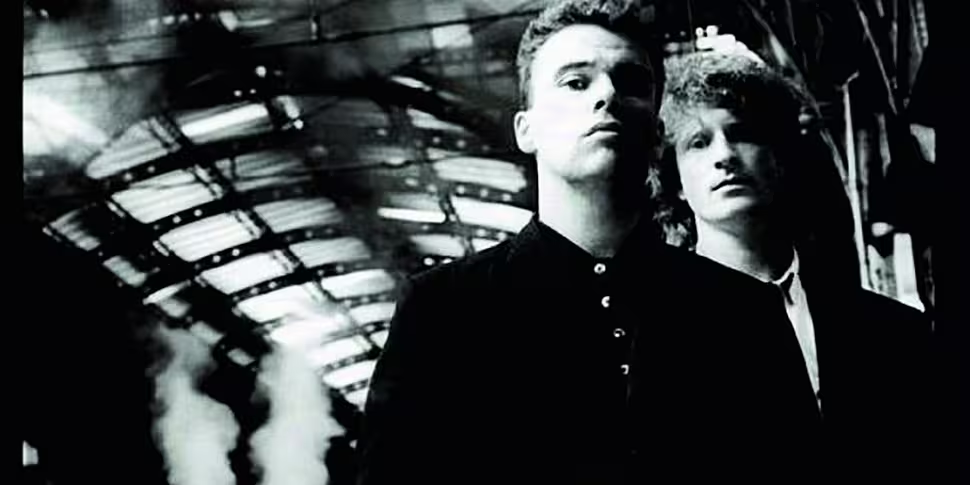This weekend, continuing our season of Documentary on Newstalk, Producer Paul McDermott tells the story of the Band Microdisney, whose 1985 album The Clock Comes Down the Stairs is regarded by many as one of the greatest Irish albums of all time.
Iron Fist in Velvet Glove – the story of Microdisney will be broadcast on Newstalk 106-108fm at 7am on Sunday 20th May, with a repeat broadcast at 9pm on Saturday 26th May.
The documentary details how Cathal Coughlan and Sean O’Hagan met in Cork in 1980 and formed Microdisney. The band went through several incarnations, played gigs throughout Ireland and eventually fragmented. A two-piece Microdisney emerged in early 1982 and released a couple of 7" singles before Cathal and Sean upped sticks to London in July 1983. Over the course of the next five years Microdisney would record two albums for Rough Trade Records and a further two for Virgin Records. Microdisney performed their last gig on July 01, 1988”Š—”Ša benefit for the Institute of Contemporary Arts at the Dominion Theatre headlined by David Bowie. The band split up a few days later. Microdisney’s 1985 album The Clock Comes Down the Stairs topped the UK Indie Charts upon its release and regularly features at the top of “the best Irish album of all time” lists.
The documentary features Cathal and Sean and contributions from industry figures, friends, contemporaries and journalists. Contributors include: Robert Forster (The Go-Betweens), Geoff Travis (Rough Trade Records), Ronnie Gurr (A&R Virgin Records), Jamie Lane (producer of The Clock Comes Down the Stairs), Andrew Mueller (journalist and writer), Elvera Butler (Downtown Kampus and Reekus Records), Gareth Ryan (Kabuki Records and Rough Trade Distribution) and Richard Boon (Production Manager, Rough Trade Records).
Former band mates also contributed including: Tom Fenner, Jon Fell, Giordai UaLaoighre and Dave Galvin. Other contributors include: Mick Lynch (Stump), Mark Healy (Cypress! Mine), Ciarán O Tuama (Cypress! Mine), Jim O’Mahony (The Belsonic Sound) and Stan Erraught (The Stars of Heaven).
Iron Fist in Velvet Glove – the story of Microdisney is Paul McDermott’s third documentary about Cork’s post-punk music scene and the bands it launched:
- Get That Monster off the Stage – the story of Finbarr Donnelly and his bands Nun Attax, Five Go Down To the Sea? and Beethoven
- Lights! Camel! Action! – the story of Stump
An Oral History longread of Microdisney can be read here:
Broadcast Times: Iron Fist in Velvet Glove – the story of Microdisney will be broadcast on Newstalk 106-108fm at 7am on Sunday 20th May, with a repeat broadcast at 9pm on Saturday 26th May.
Listen Live Online: Iron Fist in Velvet Glove – the story of Microdisney can also be listened to online at: www.newstalk.com.
Podcast: Podcast available after the broadcast at: www.newstalk.com/documentaryonnewstalk
Credits: Iron Fist in Velvet Glove – the story of Microdisney was produced by Paul McDermott and funded through the television licence fee under the BAI’s Sound & Vision scheme.
Quotes from Iron Fist in Velvet Glove – the story of Microdisney:
Cathal Coughlan: “All through my teens I had pretensions to just try and do something creative, if possible to just try and keep my parents happy as well, but maybe not. It was really only meeting Sean that gave me any indication of how you could practically go about it. To actually think about how you put a song together, I would never have had the practicality to do that if I hadn't have met Sean. The things that we learnt together are things that I still put into practice anytime that I'm fortunate enough to be able to make music. That's the only way I understand how to make music, the way that we learnt together and the way that he knew about first.”
Sean O’Hagan: “There was a joy in the music. Cathal and I meet at a party on New Year’s Eve 1979, this stumbling pair and then it ends by 1988. But here we were in 1985 with this record where it just all came together. I think that’s it, where these intentions and discussions, and influences, and shared experiences and emotional intentions, that whole thing of our growing up articulated as music. That’s exactly what The Clock… is. We were just kids, growing up but the great thing about pop music made by young people is that it is the music of young people discovering things. It is the music of youth, it absolutely is.”
Geoff Travis (Rough Trade Records): “I can remember seeing them play, they were fantastic, they were so singular, Cathal obviously is such a great character. They were one of those great conglomerates of people that are so unlikely that they are just marvellous. The thing that you have to know is that everything that ever came out on Rough Trade is something that I absolutely loved, otherwise it wouldn't have come out. That's the criterion. So I held them in very, very high regard. A lot of people think that's the best period for Rough Trade, those few years, I don't think that myself, but it certainly was a good period.”
Robert Forster (The Go-Betweens): “This is a generalisation but both bands were essentially album bands I thought, which might have worked more in the mid-70s, it might have worked more in the late 60s, but it didn't work all that well in the mid-80s in London. As soon as you were signed to a label, that was above just one person running a label, there was a lot of money about and there was a lot of labels and there was a lot of "we're going to make you a star" type people around or "if you use that producer it's going to potentially be really good for your profile" and at the same time bands like Microdisney and The Go-Betweens were struggling to survive and so it was something of a deal with the devil. I don't know if they'd see it that way but that's the way it was for us and the way I sort of perceive it to be with Microdisney too.”
Ronnie Gurr (A&R Virgin Records): “If James Joyce had discovered Punk Rock – that's Cathal Coughlan. I thought that's what made them interesting. The contrast of those lyrics with Sean's amazing melodic sense, as a counter point to that was brilliant; I don't think there was anybody doing that. That's what made them interesting, that's why I wanted to work with them.”
Jamie Lane (producer The Clock Comes Down the Stairs): “It's the only time I've been anywhere near a No. 1 record. I'm very proud of it because we made it under very lean circumstances and we used all our ingenuity and worked very hard to do it as well as we possibly could. It sounds like Merle Haggard on acid [laughing], lyrically it's biting but melodically really sweet and approachable.”









